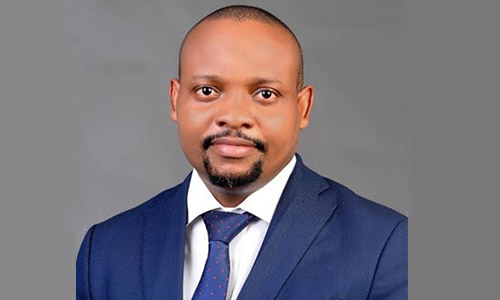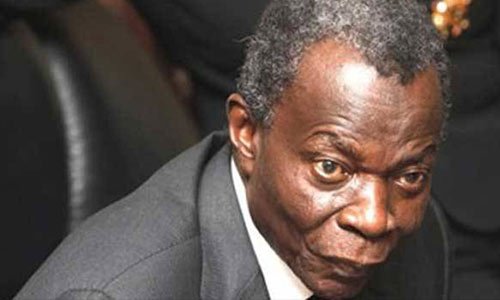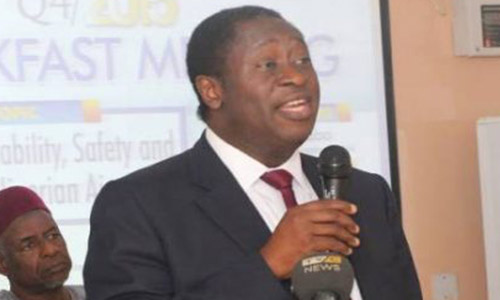By Dare Babarinsa
The cathedral is the seat of the bishop and the major church in a Protestant or Catholic diocese. The first cathedral in Nigeria is the Christ Church Cathedral on the Marina, Lagos. It is the seat of the Bishop of Lagos Diocese, Church of Nigeria (Anglican Communion). It was here that the late Primate, Archbishop Abiodun Adetiloye, had his office when he was the head and Primate Metropolitan of the Church of Nigeria. It is now the seat of the Bishop of Lagos while the Archbishop of the Province of Lagos, His Grace, Bishop Olusina Fape, has his cathedral in Shagamu where he presides as the Bishop of Remo Diocese in Ogun State.
The cathedral at the Marina is a monument of awesome grandeur. Though the cathedral was established in 1869, the foundation stone of the old church was laid in 1867. At the turn of the century, it was decided that a new cathedral was needed and an architect, Began Benjamin, was commissioned to design a fitting monument. The result is the Gothic cathedral we still have dominating the Marina till today. The Prince of Wales and the future King Edward VIII, laid the foundation stone on April 21, 1925. By the time the Cathedral was completed in 1946, Edward VIII had abdicated as the king of England, and his brother, King George, was on the throne.
A cathedral is meant to endure. It is built with meticulous details and nothing is left to chance. Last year, Right Reverent James Olusola Odedji, the bishop of the Diocese of Lagos West of the Church of Nigeria, (Anglican Communion) started the process of rebuilding the Archbishop Vining Memorial Church Cathedral. Odedeji wants a cathedral whose beauty and majesty would command the awe of generations several centuries hence.
A cathedral is therefore not an ordinary church building. There are many churches but a few cathedrals. Some men are built like the cathedral. They are products of meticulous details and their impact endures for generations. In politics, we talk of titans like Chief Obafemi Awolowo, Alhaji Ahmadu Bello, and Dr. Nnamdi Azikiwe; the three founding fathers of independent Nigeria. They have long gone but we know that they are still with us. There is no way you can mention their names without an image coming into your mind immediately. Nature has hewed them from solid oaks.
It is men and women of such solidity that give our country its stamina and staying power despite the inclement weather of Nigerian politics and enduring incompetence of some of our leaders. I don’t know of anyone in the private sector who fits this bill better than Chief Olusegun Osunkeye, former Chairman and Managing Director of Nestle Plc who will be 80 Monday, September 9. Osunkeye has served on the boards of blue-chip companies for 47 years and he remains active till today.
It is true that Osunkeye has benefitted by standing on the shoulders of giants like Dr Michael Omolayole and Chief Abebe, the first African Managing Director of the United African Company, UAC, the successor company to the Royal Niger Company. In the class of these inheritors are the likes of Abel Ubeku, Chief Ernest Shonekan, Christopher Kolade, Rufus Giwa, and Sam Bolarinde.
It is interesting that these were the men and women like the late Mrs Kuforiji Olubi who were supposed to lead the Nigerian industrial revolution and place our country on the world map. They were inheritors of mostly foreign companies who have dug roots into the fertile but also treacherous soil of Nigeria. They collaborated with the Nigerian home-grown industrialists like Chief Adeola Odutola and his successors like Aliko Dangote, Giwa Bisi Rodipe and the homegrown manufacturers of Aba and other places. It is not surprising that despite the challenges, some have moved over to the manufacture of automobiles, like Innoson Motors, and military vehicles and equipment.
The hero of Osunkeye’s story is the legendary accountant, Mr Akintola Williams. After he left Kings College, Lagos, in 1958, Osunkeye was working as a clerk in Lagos Island. By this time, every young person in Nigeria knew about Akintola Williams, the first Nigerian chartered accountant and Osunkeye’s ultimate dream was to be like him. One Saturday, he was walking near his office when he saw the signboard of Akintola Williams and Company, Chattered Accountant. He tried the lock and when it opened he gingerly entered the office and ventured into the first floor. That was where he came face-to-face with the legend. Since that day, Osunkeye’s story changed. He has found the ultimate mentor.
He was to achieve his dream and more. He studied at the Nigerian College of Arts, Science and Technology, Ibadan where he graduated in 1962 and later moved to the College of Commerce, Staffordshire in the United Kingdom where he graduated in 1965. Returning home as a chartered accountant, he was in high-demand by blue chips companies, working first with Kingsway Chemist, then Lipton and later Portland Cement (now Lafarge Cement where he served until recently as chairman of the board) and finally got employed as a management accountant by Food Specialties Ltd (now Nestle Nigeria) in 1972. It was to prove a momentous move for both Osunkeye and the company.
The management of his new companies was impressed by the devotion, industry, and integrity of their new employee and they quickly marked him out. He worked briefly as a divisional manager. The following year, Osunkeye was made an Executive Director. He was just 43. His rise and rise had begun.
It was Nestle that sent Osunkeye to the International Management Development Institute, Lausanne in Switzerland in 1980. He also served with the Nestle office in the Philippines, 1979 to 1980, and at the Nestle International Headquarters in Vevey, Switzerland in 1980. He served in Singapore and Malaysia. His schedule was crowded but he was equal to the task. Every member of the top management of Nestle International knew about the wonder kid from Nigeria. He earned his reputation as a meticulous taskmaster who gets things done no matter the odds. Soon he became known as a member of Nigeria and indeed Africa corporate aristocracy.
Osunkeye earned his epaulets. Ten years ago during Osunkeye’s 70th birthday anniversary, Martin Woolnough, the Chief Executive of Nestle explained Osunkeye’s secret formula for success. “You have the DNA, the right mix of ambition, skills, and humility together with the right values in life including a wonderful and loving family and a solid moral compass to guide you based on your faith in God,” Woolnough said. Woolnough knows that Osunkeye and his wife, Abosede, have been married now for more than 50 years. She provides for him the domestic stability that is so necessary for ambitious men.
I wish we could say the same thing about our political leaders. The ancient Jewish prophet, Isaiah said “I heard the voice of the Lord saying whom shall I send, And who would go for us?” And I said, “Here I am send me.”
In Nigeria, political leaders are the ones sending themselves. They heard neither the voice of God nor the voice of the people. Yet leadership cannot just be a wish. It is a calling. If private companies like Nestle could develop a way to recruit their leaders, then the Nigerian polity to needs to find new ways to recruit leaders. The reckless violence and mind-boggling corruption in high places are only indications of a sick polity. We need to find new and novel ways to recruit political leaders. If Nestle could do it, then Nigeria too should do it.
That someone like Osunkeye and others could rise and thrive in this environment shows that our situation may be bad, but it is not hopeless. We are capable of building new and better cathedrals.
GUARDIAN











